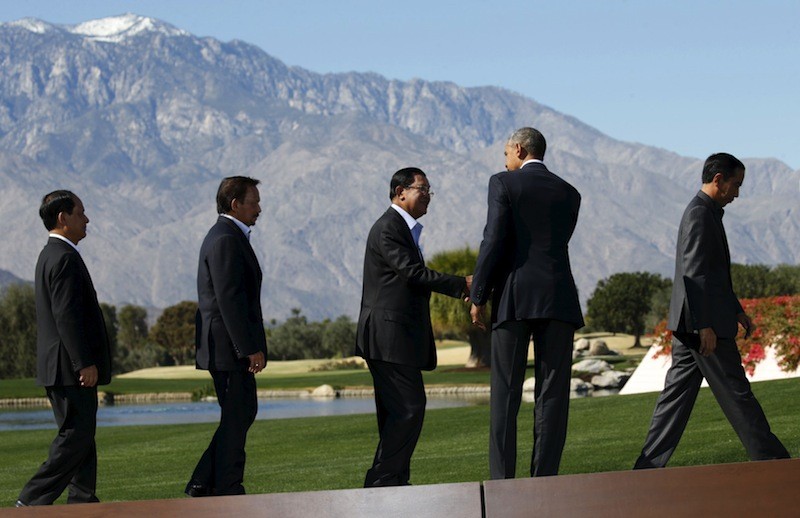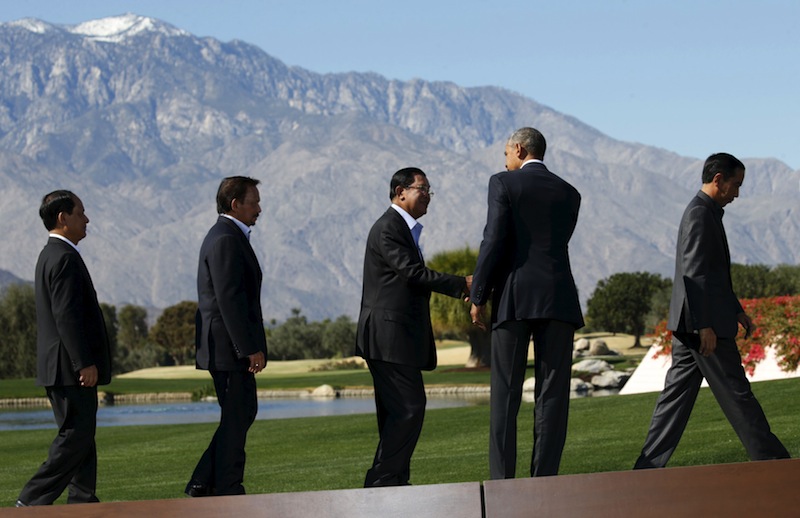Sitting in a meeting with U.S. President Barack Obama and fellow Asean leaders in California on Tuesday, Prime Minister Hun Sen seemed to have his mind on what Cambodians would think of his participation in this week’s U.S.-Asean Summit.
On his personal Facebook page, he posted eight photographs of the conference in the city of Rancho Mirage, including a pair of selfies showing himself sporting a lapel pin adorned with the logo of the summit’s venue—the Sunnylands resort—and snapshots of the other world leaders in attendance taken from the prime minister’s perspective at the round table.

“I’m not a journalist, but I wanted our Cambodian people to receive news as fast as possible,” Mr. Hun Sen wrote.
The two-day summit, which concluded on Tuesday, focused on trade—including the newly inked Trans-Pacific Partnership—and tensions in the South China Sea.
While not on the agenda, human rights abuses in Cambodia and other Southeast Asian nations also became part of the conference’s narrative, with opposition politicians, rights groups, Cambodian-American activists and even The Washington Post newspaper criticizing Mr. Obama’s decision to invite Mr. Hun Sen and his autocratic peers to the U.S.
In the face of this criticism, ruling party spokesman Sok Eysan said this week that the invitation extended to Mr. Hun Sen had been well-deserved—and reflected the U.S.’ opinion of Cambodia’s current human rights situation.
“It’s a very great honor for Cambodians that our Cambodian high delegation, led by Samdech Techo Hun Sen, has been invited by President Obama, a leader of a great world power, to attend the meeting,” Mr. Eysan said.
As for the CPP’s critics—some of whom organized a protest of several hundred people outside the Sunnylands resort on Monday—Mr. Eysan said Mr. Obama’s willingness to invite Mr. Hun Sen to California should serve as a wake-up call for them.
“It means that President Barack Obama is optimistic about Cambodia’s situation by not believing the incitement of a small group of the opposition side,” he said.
“It’s like a big, heavy wooden stick hitting the heads of the opposition people who have never used clear common sense about Cambodia’s situation.”
Opposition lawmaker Mu Sochua, who holds U.S. citizenship, had a different takeaway from Mr. Hun Sen’s trip to the U.S.—his first official visit.
She said the meeting was a manifestation of the U.S.’ strategic interests in Southeast Asia and its desire to engage with the region as a whole, but noted the likelihood that some of the invited leaders would seize the opportunity to seek greater legitimacy through their proximity to Mr. Obama.
“The U.S. has an agenda which is building steps to strengthen its Asia pivot strategy,” Ms. Sochua said in an email. “[The] ASEAN Summit hosted by President Obama is the recognition that some ASEAN leaders—those leading a facade of democracy—have been desperately looking for.”
“To have the summit in the U.S. means that prime minister Hun Sen would be invited and he would accept.”
Political analyst Ou Virak also said Mr. Eysan’s assessment was flawed, and that the premier’s trip to Sunnylands was more a function of Cambodia’s membership in Asean, a regional association whose modus operandi is decision-making by consensus.
“You look for a subtle message—whether the Obama administration gives them any subtle message or such—and there’s no such thing, because Hun Sen is basically part of an Asean delegation, and Obama wants to engage with Asean,” Mr. Virak said.
“I wouldn’t read too much into the meaning except for the fact that I think the U.S. is definitely paying very, very close attention to Asean as a region.”
Carl Thayer, a Southeast Asia expert at the Australian Defense Force Academy, said any attempt by Mr. Hun Sen to leverage his U.S. appearance for political gain would likely be met with resistance.
“Hun Sen can attempt to do that, but I think the U.S. will be quick to undercut that,” he said. “Thailand and Cambodia are in the bad boy spot, quite frankly.”
And with U.S. sights set on a closer strategic relationship with Asean, the inclusion of Cambodia on the Sunnylands roster was a must, Mr. Thayer said, citing a planned 2007 U.S.-Asean Summit at then-U.S. President George W. Bush’s Texas home that was canceled after the organizers attempted to exclude Burma.
“When I mention President Bush inviting Asean to Crawford Ranch and excluding Myanmar, and Asean wouldn’t attend, that’s the point. You can’t have a summit in Sunnylands and exclude Cambodia,” he said.
“Obama has a larger strategic vision and the summit isn’t about the South China Sea, it’s not just about the TPP, it’s about the action plan of a strategic partnership.”
U.S. Embassy spokesman Jay Raman declined to comment on Mr. Eysan’s interpretation of Mr. Hun Sen’s attendance at the Sunnylands summit, but in remarks to the media in California on Monday, U.S. national security adviser Susan Rice dismissed the notion that it represented an endorsement.
“We deal with countries around the world, including in Asia, with whom we have serious disagreements on human rights, on democracy, on corruption, and yet we do talk to them,” Ms. Rice said.
“So just because, in Asia, as elsewhere, we are obliged to deal with governments, including in some cases those with whom we have significant disagreements on things like human rights, does not mean that we’re legitimizing them or their behavior.”




